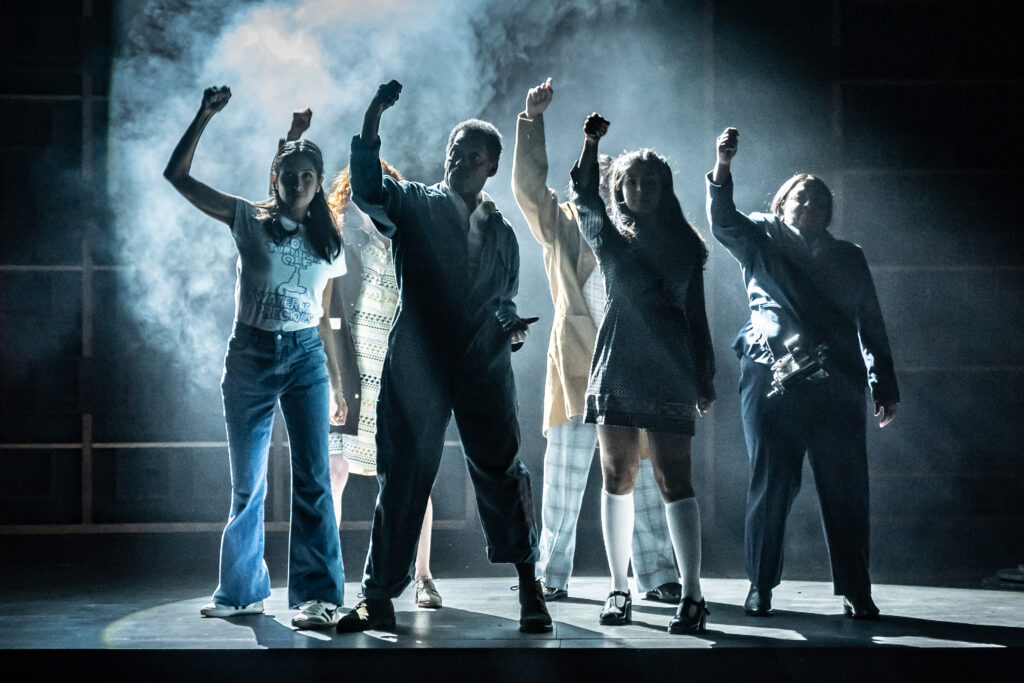Kiln Theatre, London – until 9 October 2021
Reviewed by Alun Hood
4****
This is community theatre in the truest sense. The Kiln is right in the heart of North West London, and it’s autumn offering is a trio of short plays set in the immediate vicinity, albeit at two different points in modern history. Educational and richly entertaining, NW Trilogy emerges, in Taio Lawson and Susie McKenna’s vibrant production as a sparky, moving valentine to what is traditionally one of the capital’s most diverse neighbourhoods.
Given that not only are there two directors but a trio of writers (Moira Buffini, Roy Williams and Suhayla El-Bushra) involved in the project, it is remarkable how consistent the tone of the entire evening is. Although each short piece is discrete from the others, the overall sense of shared history and cumulative experience, across history, race and gender, is superbly done, the whole company sweeping on to effect scene changes, or act as supernumeraries. Certain themes echo and weave tantalisingly through each text: the commonality of music, the breakdown in communication between men and women, the struggle immigrants have often had to receive acceptance in London, the way an act of unfathomable kindness or cruelty can have a transformative effect on individual lives…. This is powerful, thought-provoking stuff that may occasionally teeter on the brink of sentimentality but is, for the most part, a riveting couple of hours, shot through with some genuine belly laughs and more than a few tears.
The opener, Moira Buffini’s delicate but tough ‘Dance Floor’, set out-of-hours in a 1950s Irish dance hall, is a real beauty. Two women, the older one authoritative but not unkind (Aoife McMahon, perfection) and the younger newly arrived from Donegal, deeply homesick and in trouble (exquisite work by Claire Keenan, who also has the most ethereally lovely singing voice), clean up after the preceding night’s revelry. It’s impossible to describe the plot without spoilers but suffice it to say that it’ll leave you with a real lump in your throat, and includes a terrific turn by Emmet Byrne as one of the guests who imbibed well but not wisely the night before. Vastly more ambitious than it initially appears, ‘Dance Floor’ packs more joy and gentle devastation into it’s brief running time than many plays four times its length can manage.
Roy Williams’s ‘Life of Riley’ flashes forward to 1976 and depicts an edgy meeting between mixed race Paulette and her successful reggae musician father, who left the family home when she was three. Paulette is repelled by her father’s selfishness and resents his abandonment of her as a mixed race child in an intolerant city, but is drawn despite herself to his talent and the perceived glamour of his connections (“I knew Bob Marley before he was Bob Marley!”) Williams’s writing is fresh and salty, with a lot to say about the race relations and sexual politics of the time, and Harmony Rose Bremner and Chris Tummings mine it for all it’s pain and humour. When they sing together it’s authentically magical. Again, here is a short, but far from small, play that is completely satisfying.
If Suhayla El-Bushra’s final section ‘Waking/Walking’ is less impressive than It’s companions, that is because it’s the only part of the trilogy that really feels as though it ought to be a full length piece. Inspired by the Grunwick dispute, it filters the turbulent tale of female East African Asian workers striking for better working conditions in the late 1970s, through a domestic comedy drama that seems a little hemmed-in but still repeatedly and pleasingly confounds expectations in terms of character and plot development. The lurch from the nicely observed, often very funny, family tragi-comedy of the first scene to an impassioned, increasingly disillusioned monologue for the family matriarch (delivered with excoriating emotional dexterity by Natasha Jayetileke), forced by financial circumstances to defy the strike and return to work (“These were the women who cried for me when I could no longer cry myself”), is dramaturgically clumsy, although it paves the way for a rabble rousing final tableau that fairly yanks the audience out of their seats.
All of the acting is first rate, and directors Lawson and McKenna skilfully balance the ferocity and vitality of the texts with genuinely poignant moments – note the way Tummings’s hard-bitten Riley gently reaches out to touch his daughter’s hair while she is otherwise engaged writing her phone number on his inner arm – and the whole night moves at a cracking pace. Designer Sadeysa Greenaway-Bailey ingeniously makes the extended Kiln stage look simultaneously immense yet claustrophobic, and Richard Howell’s lighting is very successful, evoking a past bathed one moment in a nostalgic glow and in the next, in a harsh, uncompromising reality.
NW Trilogy is steeped in the stories and energy of North West London, but it is worth travelling from any postcode for. A magnificent evening.

